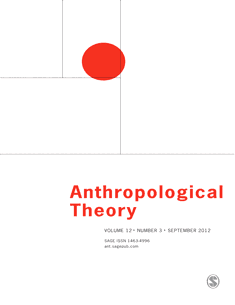
Anthropological Theory
Scope & Guideline
Connecting Scholars through Rich Anthropological Discourse
Introduction
Aims and Scopes
- Critical Examination of Sovereignty and Power Dynamics:
The journal focuses on how sovereignty is constructed and contested in various contexts, analyzing the implications of power relations in contemporary societies. - Migration and Urban Incorporation:
A significant area of study involves the complexities of migration, including how migrants navigate urban environments and the socio-political landscapes they inhabit. - Decolonization and Indigenous Perspectives:
The journal emphasizes the importance of decolonial thought and indigenous perspectives, challenging traditional anthropological narratives and exploring the dynamics of power and resistance. - Ethics and Social Justice:
There is a consistent focus on ethical considerations within anthropology, particularly in relation to social justice, human rights, and the anthropologist's role in contemporary issues. - Interdisciplinary Approaches:
Anthropological Theory encourages interdisciplinary methodologies, often drawing insights from sociology, political science, and cultural studies to enrich anthropological discourse.
Trending and Emerging
- Migration and Transnationalism:
The journal is increasingly focusing on migration as a critical area of inquiry, exploring the complexities of transnational identities, urban integration, and the politics surrounding migration. - Sovereignty and Statecraft:
There is a growing trend in analyzing sovereignty, particularly in relation to extractive practices and political resistance, reflecting a broader interest in the intersections of state power and local agency. - Decolonial and Anti-Racist Frameworks:
Emerging themes include a strong emphasis on decolonial perspectives and anti-racist frameworks, which challenge dominant narratives and advocate for social justice within anthropological discourse. - Ethical Challenges in Anthropology:
Recent works are increasingly engaging with ethical dilemmas faced by anthropologists, particularly in relation to representation, consent, and the responsibilities of researchers towards their subjects. - Interdisciplinary Theoretical Engagements:
The journal is expanding its scope to include interdisciplinary theoretical engagements, drawing from diverse fields to enrich anthropological analysis and foster innovative perspectives.
Declining or Waning
- Traditional Ethnographic Methods:
There seems to be a waning interest in conventional ethnographic methods, as the journal increasingly prioritizes theoretical frameworks and critical analyses over purely descriptive ethnographic studies. - Focus on Environmental Anthropology:
Although environmental issues remain relevant, the specific focus on environmental anthropology has diminished, with fewer papers addressing ecological concerns directly in the recent publications. - Historical Anthropology:
The exploration of historical contexts within anthropological research appears to be less prevalent, as contemporary issues and theoretical debates have taken center stage. - Essentialist Views on Identity:
There is a noticeable decline in discussions centered around essentialist notions of identity, as the journal increasingly moves towards more fluid and intersectional understandings of identity.
Similar Journals

Sociologiceskoe Obozrenie
Championing unrestricted access to sociological and philosophical insights.Sociologiceskoe Obozrenie is a distinguished open-access journal published by the NATIONAL RESEARCH UNIVERSITY HIGHER SCHOOL OF ECONOMICS in the Russian Federation. Since its inception in 2001, this journal has made significant strides in bringing forth scholarly discussions in the realms of Cultural Studies, Philosophy, Sociology, and Political Science. With its established reputation, evidenced by its Q1 ranking in both Cultural Studies and Philosophy in 2023, and its notable Scopus ranks across disciplines, the journal provides a robust platform for researchers, professionals, and students alike to engage with contemporary sociological and philosophical thought. The journal's commitment to open access promotes the unrestricted dissemination of knowledge, making it an invaluable resource for the global academic community. With a focus on interdisciplinary approaches, Sociologiceskoe Obozrenie continues to address pressing societal issues, fostering an environment conducive to critical analysis and innovative research.
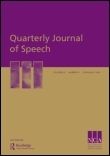
QUARTERLY JOURNAL OF SPEECH
Innovative Insights: Shaping the Future of Communication StudiesQUARTERLY JOURNAL OF SPEECH, published by Routledge Journals, Taylor & Francis Ltd, stands as a premier platform for scholarly discourse in the fields of communication, linguistics, and education. With origins tracing back to 1915 and continuing its impactful contributions through 2024, this journal has earned a respected place in academia, reflected in its Q2 status in Communication and Q1 ranking in Linguistics and Language. Its robust profile, ranked in the 80th percentile for Language and Linguistics across Scopus, emphasizes the journal's significant role in advancing research and theory in its disciplines. Although not an Open Access journal, QUARTERLY JOURNAL OF SPEECH offers valuable insights and innovative perspectives that enhance understanding of communication practices and linguistic methodologies, making it an essential resource for researchers, professionals, and students eager to explore the complex interplay of language and society.
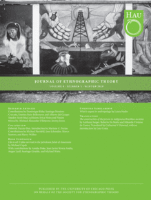
HAU-Journal of Ethnographic Theory
Challenging Paradigms, Enriching Ethnographic Understanding.HAU-Journal of Ethnographic Theory, published by University of Chicago Press, stands as a leading platform for scholarly discourse in the field of anthropology. Established in 2011, this esteemed journal focuses on ethnographic methodologies and theoretical advancements, offering a significant contribution to the understanding of human cultures and social practices. With an impressive Q2 ranking in anthropology and a strong placement in the 63rd percentile among peers in the Scopus rankings, HAU ensures high visibility and impact within the academic community. Although the journal currently does not offer open access, it is widely available for institutions, fostering a global dialogue among researchers, professionals, and students. As it converges its content towards 2024, HAU remains dedicated to publishing innovative research that challenges existing paradigms and encourages critical reflection, solidifying its importance in the continuous evolution of ethnographic theory.

Social Analysis
Bridging Anthropology, Culture, and SocietySocial Analysis, an esteemed academic journal published by BERGHAHN JOURNALS, is at the forefront of interdisciplinary research, focusing on the dynamic intersections of anthropology, cultural studies, sociology, and the arts and humanities. Since its inception in 2002 and having transitioned to an Open Access model in 2020, the journal ensures that critical social research is widely accessible to scholars and the public alike. With an impressive Q1 ranking in Anthropology and cultural studies and holding a notable Q2 in Sociology and Political Science, it garners attention from a large academic audience, as evidenced by its high Scopus rankings: 10th in general arts and humanities and 153rd in cultural studies. This signifies its influential role in shaping contemporary discourse and providing a platform for innovative ideas and methodologies in understanding social phenomena. Based in Brooklyn, NY, the journal is dedicated to fostering scholarly dialogue and advancing the field, making it an essential resource for researchers, professionals, and students eager to engage with and contribute to the field of social analysis.

Revista Espanola de Antropologia Americana
Engaging Minds in the Study of American SocietiesRevista Española de Antropología Americana, published by UNIV COMPLUTENSE MADRID, SERVICIO PUBLICACIONES, stands as a significant contribution to the field of anthropology, particularly focusing on American societies and cultures. Since its inception in 1970, this journal has evolved, with issues currently being published until 2024, providing a platform for original research, reviews, and scholarly discourse. Despite being a Q3 category journal in the 2023 rankings, it plays a pivotal role in disseminating knowledge and stimulating academic debate within the anthropology community. With an ISSN of 0556-6533 and an E-ISSN of 1988-2718, Revista Española de Antropología Americana strives to engage researchers, professionals, and students with insightful content that reflects the dynamic nature of cultural studies. Although it operates under traditional access models, the rich array of topics covered ensures its relevance to ongoing scholarly conversation in social sciences and anthropology. Addressing a diverse array of anthropological themes, this journal is essential for anyone looking to deepen their understanding of the cultural frameworks shaping American societies.
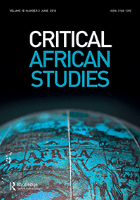
Critical African Studies
Advancing Critical Discourse on African IssuesCritical African Studies, published by TAYLOR & FRANCIS LTD, is a premier journal dedicated to advancing the discourse on critical issues affecting Africa and its diaspora. With an ISSN of 2168-1392 and an E-ISSN of 2040-7211, this journal has established itself as a leading publication in the field of Arts and Humanities, ranked Q1 in Arts and Humanities (miscellaneous) and Q2 in Social Sciences (miscellaneous) as of 2023, showcasing its commitment to high-quality research. Over its converged years from 2015 to 2024, it has become a critical platform for scholars and practitioners to explore diverse perspectives, innovative ideas, and multidisciplinary approaches to issues such as social justice, governance, and cultural narratives within the African context. The journal's Scopus rankings reflect its significant impact, with impressive placements in both the Arts and Humanities and Social Sciences categories. Critical African Studies aims to foster a robust dialogue among researchers, professionals, and students, making it essential reading for anyone interested in the complexities of Africa's socio-political landscape and cultural heritage.
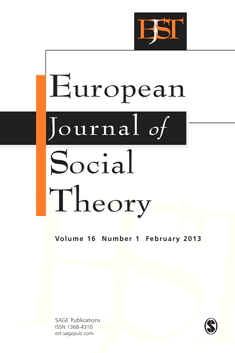
European Journal of Social Theory
Connecting theory with practice in a rapidly changing world.The European Journal of Social Theory (ISSN: 1368-4310; E-ISSN: 1461-7137), published by SAGE Publications Ltd, stands as a pivotal resource in the fields of sociology and political science. With a commendable impact factor, recognized within the top quartile (Q1) of its category as per the 2023 rankings, this journal plays a crucial role in shaping contemporary social theory discourse. Covering a broad spectrum of theoretical frameworks and empirical research, the journal aims to facilitate critical engagements with the complex social dynamics characterizing Europe and beyond. Its alignment with high standards of academic rigor is demonstrated through a strong Scopus ranking (Rank #210/1466, 85th percentile), making it an essential read for researchers, professionals, and students alike. As it converges on its mission from 1998 to 2024, the European Journal of Social Theory continues to inspire innovative thought and robust debate within the social sciences.

Boletin Antropologico
Connecting Scholars to the Heart of Human SocietyBoletin Antropologico, published by UNIV LOS ANDES, is a vital academic journal dedicated to the field of anthropology, focusing on the diverse cultural practices, social structures, and historical contexts of societies, particularly within Latin America. With its ISSN of 0257-750X, this journal aims to provide a platform for researchers and scholars to disseminate their findings and engage in meaningful discussions that advance the understanding of anthropological issues. Although Boletin Antropologico currently does not follow an open-access model, it remains a significant resource for professionals seeking peer-reviewed content that reflects rigorous academic standards. With a commitment to fostering intellectual growth and collaboration among anthropologists, the journal serves as an essential reference for students and practitioners keen on exploring the rich tapestry of human cultures and societies.
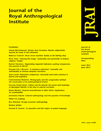
JOURNAL OF THE ROYAL ANTHROPOLOGICAL INSTITUTE
Bridging Cultures Through Scholarly ExcellenceJOURNAL OF THE ROYAL ANTHROPOLOGICAL INSTITUTE, published by Wiley, stands as a prestigious platform for scholarly discourse in the field of anthropology. With an ISSN of 1359-0987 and an E-ISSN of 1467-9655, this journal has been a vital resource for researchers, professionals, and students since its inception, featuring contributions that push the boundaries of understanding in both cultural and social anthropology. The journal’s rigorous peer-review process affirms its high academic standards, reflected in its top-tier Q1 rankings in both the Anthropology and Arts and Humanities categories for 2023. With a current ranking of #78 out of 502 in Social Sciences Anthropology and #138 out of 552 in Miscellaneous Arts and Humanities, it inhabits a critical space within academia, addressing seminal issues and innovative research. While the journal is not open access, it remains accessible to those affiliated with institutions that provide subscriptions, ensuring that groundbreaking anthropological insights are disseminated widely within the academic community. As it converges from 1995 to the present, the JOURNAL OF THE ROYAL ANTHROPOLOGICAL INSTITUTE continues to shape the landscape of anthropological research, engaging a diverse readership eager to explore the intricate tapestry of human cultures.

Annual Review of Anthropology
Shaping the Future of Anthropological DiscourseAnnual Review of Anthropology is a premier journal published by Annual Reviews, dedicated to providing comprehensive and authoritative reviews in the field of anthropology. Established with the goal of synthesizing essential research findings, this influential publication not only shapes contemporary anthropological discourse but also facilitates interdisciplinary dialogue within the broader realm of social sciences and cultural studies. With an impressive impact factor that places it in the Q1 category across multiple classifications, including Anthropology and Arts and Humanities, this journal is highly regarded by researchers and academics alike. The Annual Review of Anthropology has been a trusted resource for critical insights and transformative ideas, helping to advance the understanding of human societies from 1980 to the present. Although it does not offer open access, access to its articles is available through various academic institutions, ensuring that both seasoned scholars and students can benefit from its wealth of knowledge. With a Scopus ranking placing it in the top percentiles for relevant subjects, this journal is essential reading for anyone looking to stay at the forefront of anthropological research.